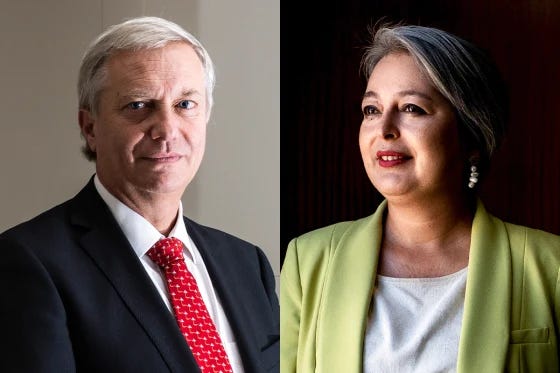The Chasm of Choice: When Freedom’s Canvas Fractures Into Ideological Straits
Chile’s presidential runoff presents a stark, almost apocalyptic, choice between a far-right candidate and a communist. This article dissects the societal forces driving such profound polarization, arguing that Chile’s democratic crossroads reflects a perilous global trend where the illusion of absolute choice threatens the very foundations of free societies.
The Big Question: Why Do Societies Embrace Extremes?
The question looming over Chile’s presidential runoff, and indeed over much of the modern democratic world, is this: why, in an age of unprecedented information access and supposed enlightenment, do societies seem increasingly drawn to the stark, often dangerous, certainties of political extremes? We find ourselves at a critical juncture, where the very act of democratic choice appears to be fracturing the social fabric into irreconcilable ideological straits.
I’ve watched as Chile, a nation once lauded for its stable democratic transition, now grapples with a binary election between the far-right José Antonio Kast and the communist Jeannette Jara. This isn’t just a political contest; it’s an existential crisis that exposes a universal human weakness—our yearning for definitive answers and the comfort of belonging, even if it means sacrificing complexity and genuine freedom. We seem to be choosing simplified narratives over the arduous work of nuanced understanding, falling into what Erich Fromm insightfully noted:
Man is primarily a being who has to find meaning in his life, and if he fails to find it, he tries to escape from his freedom.
– Erich Fromm
This escape manifests in the embrace of rigid ideologies that promise order, identity, and a clear enemy, shielding us from the terrifying responsibility of self-directed liberty.
The Study Simplified: Chile’s Ideological Battleground
At its core, the Chilean election simplifies into a battle between two fundamentally opposed visions. On one side, José Antonio Kast represents a hard-right conservatism, harkening back to an authoritarian past, emphasizing order, traditional values, and a strong hand on immigration. His appeal often lies in a promise of stability and a return to perceived greatness, attracting those disillusioned with the perceived failures of progressive governments and the complexities of modern social change.
On the other side, Jeannette Jara, representing the communist party, offers a vision of radical social justice, wealth redistribution, and expansive state intervention. Her platform resonates with those who feel marginalized, exploited, and left behind by neoliberal policies, advocating for a complete overhaul of the economic and social structure. Both candidates, in their distinct ways, speak to a deep sense of grievance and a desire for radical change, leaving little room for a moderate consensus.
The study of this election reveals a concerning trend: the erosion of the middle ground. Voters are not merely choosing between policies, but between worldviews that offer comprehensive, often totalizing, interpretations of society’s ills and their solutions. This polarization is not unique to Chile; it is a global symptom, exacerbated by digital echo chambers and a pervasive sense of urgency that demands immediate, sweeping transformations.
Why It Matters: A Global Prophecy of Political Fragmentation
Chile’s electoral battle is more than a Latin American anomaly; it is a stark prophecy for democracies across the globe. The deep divisions among immigrants, for instance, mentioned in the initial reports, underscore how populist narratives can exploit social anxieties, turning diverse communities into scapegoats for systemic failures. This election reveals how easily societies can be driven to choose between perceived salvation and existential threat, rather than engaging in incremental progress.
What we are witnessing in Chile is the logical conclusion of a political climate where the ‘other’ is demonized and complexity is abhorred. It is a terrifying testament to the fragility of democratic institutions when faced with deeply entrenched ideological silos. The stakes are existential, touching upon the very essence of truth, freedom, and meaning. When dialogue breaks down and compromise is seen as weakness, societies risk becoming what Václav Havel described:
When we are forced to lie, we are forced to live within a lie.
– Václav Havel, “The Power of the Powerless”
Here, the ‘lie’ is the false dichotomy, the insistence that only one extreme offers the path to salvation, forcing citizens to choose sides in a narrative that leaves no room for genuine deliberation or a shared reality. The true danger lies not in the existence of diverse political views, but in the institutionalized denial of shared ground and collective reason. This dynamic corrodes trust, not just in institutions, but in each other.
How to Apply It: Navigating the Ideological Abyss
For us, observing from afar but intrinsically connected to these global currents, the Chilean election offers a crucial lesson. It demands a heightened awareness of the forces that push us toward tribalism and away from shared civic life. We must actively resist the seductive simplicity of absolute answers and cultivate a deeper appreciation for nuance and complexity. This means interrogating our own biases, seeking out diverse perspectives, and engaging in difficult conversations with empathy, not just intellectual superiority.
Practically, this could mean supporting media that prioritizes investigative journalism over sensationalism, engaging in local community building that transcends political labels, and consciously stepping out of our own ideological echo chambers. It requires a personal commitment to the hard work of democratic citizenship, understanding that true progress is often incremental and messy, not delivered through a single, revolutionary ballot. The choice, ultimately, is not just between Kast and Jara, but between an intellectual laziness that embraces simple narratives and the moral courage required to grapple with uncomfortable truths and build a more inclusive future.




This describes the entire scenario in which we find ourselves. The shortcuts of soundbites vs the labor of cognitive processing perhaps a sign of our times to prefer certainty over seeing the beauty of complexity in varied contributions toward social cohesion. A more “inclusive future” will ultimately help us all, yet the power to seal the deal and own the future is way too tempting for the ambitious. Mutual trust is far healthier than combative power.